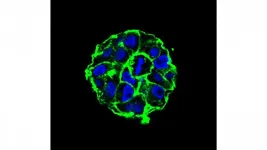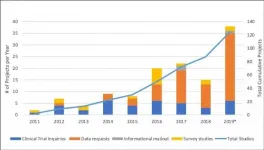Cancer research expands body's own immune system to kill tumors
Scientists are working to expand the way they have made immune cells fight tumors from a small handful of cancers to a wide array of them
2021-02-02
(Press-News.org) WASHINGTON, February 2, 2021 -- Scientists are hoping advances in cancer research could lead to a day when a patient's own immune system could be used to fight and destroy a wide range of tumors.
Cancer immunotherapy has some remarkable successes, but its effectiveness has been limited to a relatively small handful of cancers. In APL Bioengineering, by AIP Publishing, a team from Stanford University and Genentech describes how advances in engineering models of tumors can greatly expand cancer immunotherapy's effectiveness to a wider range of cancers.
"One of the biggest breakthroughs we've had in cancer research in decades is that we can modify the cells in your own immune system to make them kill cancer cells," said author Joanna Lee.
Using existing immunotherapy advances, scientists have figured out a way to make the T-cells already inside "hot" or inflamed tumors start fighting them. But that breakthrough does not help with "cold" or noninflamed tumors, because the immune cells are not in the right place.
"Now, a big push in drug discovery in cancer is how do how to make those cold tumors hot?" Lee said. "How do we get immune cells into those tumors?"
To do that, scientists need to first recreate those changes in a laboratory. While much research can be done in a 2D environment, like a petri dish, modeling the way immune cells interact with cancer requires a more advanced 3D environment.
Building the tumor microenvironment, Lee said, will require expertise from both biologists, like herself, and engineers, like co-author Ovijit Chaudhuri.
"Trying to merge those two fields together is what has made the 3D culture field really challenging," she said. "The reason it's so hard is we are not just talking about having a plate you throw some cells in. It is more like building a house."
A faithful 3D model for cold tumors would make the research leading to new cancer drugs faster and more efficient. Lee said that is a big deal in a field where proposed new treatments take years to be approved and an overwhelming 96.6 % of them fail.
"If we could translate the success we've had with inflamed tumors to cold tumors, that would be a huge breakthrough," Lee said. "That's what we are going for in building these 3D culture models."
INFORMATION:
The article "Perspective: Modeling the tumor immune microenvironment for drug discovery using 3D culture" is authored by Joanna Y. Lee and Ovijit Chaudhuri. The article will appear in APL Bioengineering on Feb. 2, 2021 (DOI: 10.1063/5.0030693). After that date, it can be accessed at https://aip.scitation.org/doi/10.1063/5.0030693.
ABOUT THE JOURNAL
APL Bioengineering is an open access journal publishing significant discoveries specific to the understanding and advancement of physics and engineering of biological systems. See http://aip.scitation.org/journal/apb.
[Attachments] See images for this press release:

ELSE PRESS RELEASES FROM THIS DATE:
2021-02-02
GRAND RAPIDS, Mich. (Feb. 2, 2021) -- What does bile acid production in the digestive tract have to do with Parkinson's disease?
Quite a lot, according to a sweeping new analysis published in the journal Metabolites. The findings reveal that changes in the gut microbiome -- the rich population of helpful microbes that call the digestive tract home -- may in turn alter bile acid production by favoring synthesis of toxic forms of the acids.
These shifts were seen only in people with Parkinson's and not in healthy controls, a critical difference that suggests bile acids may be a viable biomarker for diagnosing Parkinson's early and tracking its progression. The insights also may provide new avenues for developing therapies ...
2021-02-02
Colorectal cancer is the second most common cause of cancer-related mortality among men and women in the United States, according to the American Cancer Society. At-home tests, which measure blood in stool as a potential marker for colon cancer, are often used for colorectal cancer screening.
Usage of these tests has increased during the COVID-19 pandemic as people try to avoid clinical visits. However, effectiveness of these screening tools, along with all colon cancer screenings, requires a follow-up colonoscopy if an abnormal test result occurs. The problem is ...
2021-02-02
Researchers at the George Washington University and University of California, Los Angeles, have developed and demonstrated for the first time a photonic digital to analog converter without leaving the optical domain. Such novel converters can advance next-generation data processing hardware with high relevance for data centers, 6G networks, artificial intelligence and more.
Current optical networks, through which most of the world's data is transmitted, as well as many sensors, require a digital-to-analog conversion, which links digital systems synergistically to analog components.
Using a silicon photonic chip platform, Volker J. Sorger, an associate professor of electrical and computer ...
2021-02-02
DeKalb, Ill. -- If you build it, they might not come. That's the key finding of a END ...
2021-02-02
DENVER (Feb. 2, 2021) - Jongeun You, a researcher at the University of Colorado Denver, recently END ...
2021-02-02
Amsterdam, February 2, 2021 - The Canadian Neuromuscular Disease Registry (CNDR) was launched in 2010 to increase efficient patient access to cutting-edge research and clinical trials, to increase understanding of the natural history and epidemiology of neuromuscular disease across Canada, and to facilitate research collaboration. An assessment of CNDR's accomplishments, published in the Journal of Neuromuscular Diseases, found that it has been successful in securing funding and engaging the community over the past 10 years. With more than 4,000 enrolled patients, data from the registry have been used in over 125 research projects as of 2019, including clinical trial and research notifications, patient questionnaires, and data analyses around ...
2021-02-02
The mesmerizing flow of a sidewinder moving obliquely across desert sands has captivated biologists for centuries and has been variously studied over the years, but questions remained about how the snakes produce their unique motion. Sidewinders are pit vipers, specifically rattlesnakes, native to the deserts of the southwestern United State and adjacent Mexico.
Scientists had already described the microstructure of the skin on the ventral, or belly, surface of snakes. Many of the snakes studied, including all viper species, had distinctive rearward facing "microspicules" (micron-sized protrusions on scales) that had been interpreted in the context of reducing ...
2021-02-02
PROVIDENCE, R.I. [Brown University] -- Studies have shown that nearly half of all medical students in the U.S. report symptoms of burnout, a long-term reaction to stress characterized by emotional exhaustion, cynicism and feelings of decreased personal accomplishment. Beyond the personal toll, the implications for aspiring and practicing physicians can be severe, from reduced quality of care to increased risk of patient safety incidents.
According to a new study published on Tuesday, Feb. 2, in JAMA Network Open, students who identify as lesbian, gay or bisexual ...
2021-02-02
Period poverty, a lack of access to menstrual hygiene products, and other unmet menstrual health needs can have far-reaching consequences for women and girls in the United States and globally.
New research led by George Mason University's College of Health and Human Services found that more than 14% of college women experienced period poverty in the past year, and 10% experienced period poverty every month. Women who experienced period poverty every month (68%) or in the past year (61.2%) were more likely to experience moderate or severe depression than those who did not experience period poverty (43%).
Dr. Jhumka Gupta, an associate professor at George Mason University was senior author of the study published in BMC Women's Health. ...
2021-02-02
MINNEAPOLIS- February 2, 2021 - In Minnesota, there are currently about END ...
LAST 30 PRESS RELEASES:
[Press-News.org] Cancer research expands body's own immune system to kill tumors
Scientists are working to expand the way they have made immune cells fight tumors from a small handful of cancers to a wide array of them





